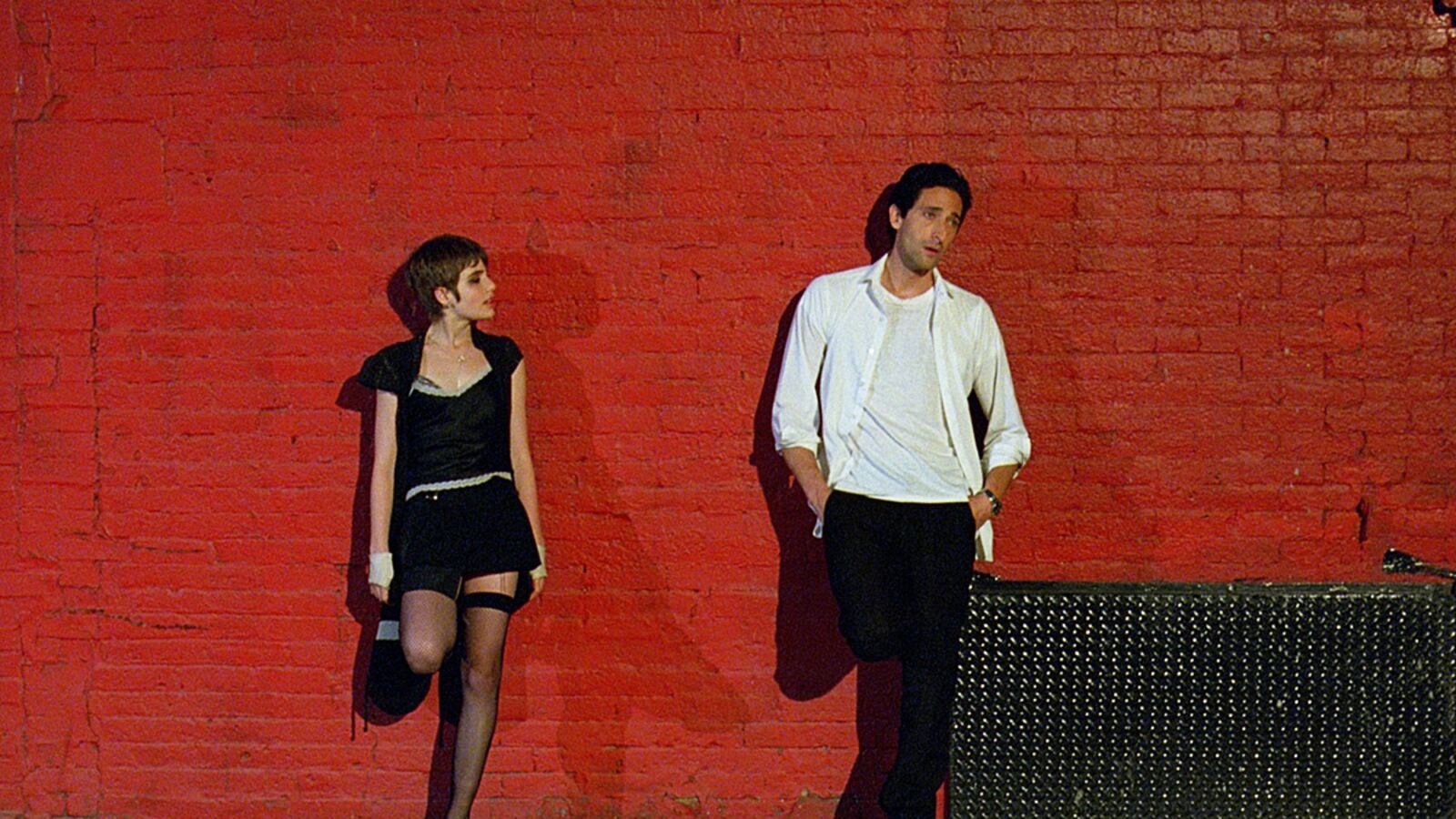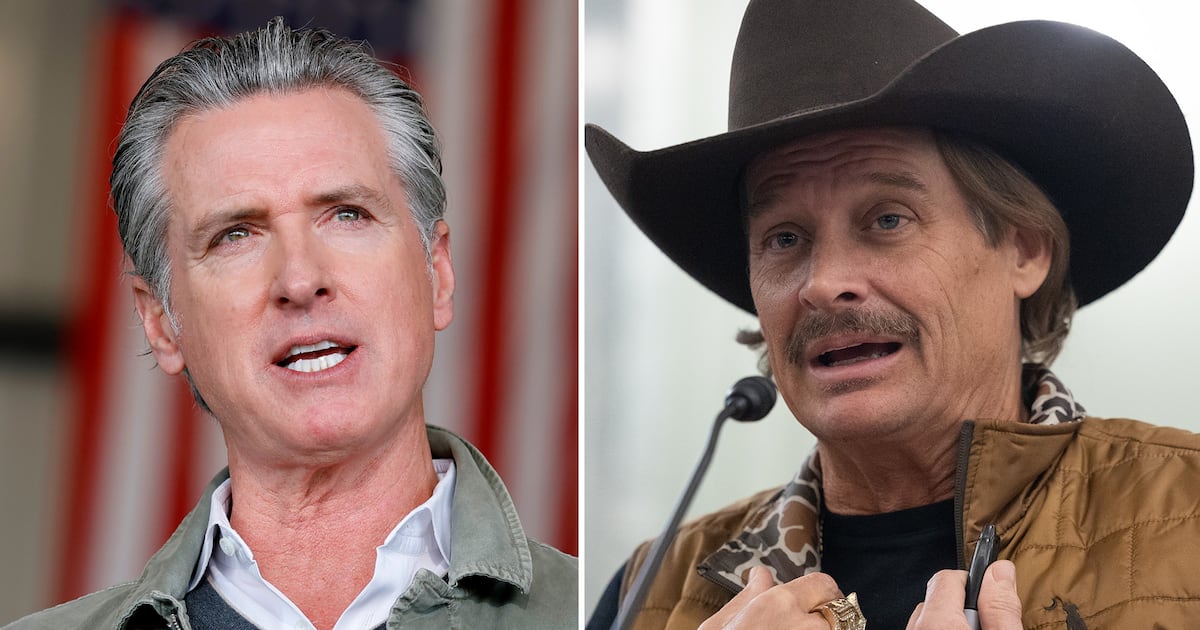It was the kiss seen round the world.
When The Pianist’s Adrien Brody won the Academy Award for Best Actor in 2003, the audience at the Kodak Theatre erupted in applause. His four venerable opponents—Jack Nicholson, Daniel Day-Lewis, Michael Caine, and Nicolas Cage, all past Oscar recipients—rose to their feet in amazement. As the wiry actor stumbled up to the stage, he extended his arms toward the crowd and then, in a fit of giddy jubilation, made a beeline for presenter Halle Berry and gave her a deep, passionate, nonconsensual kiss. At 29, Brody became the youngest ever to win the Best Actor Oscar—a distinction he still holds.
However, with the exception of a dazzling cameo as Salvador Dalí in Woody Allen’s Midnight in Paris, the past few years have been a disaster for Brody. He sued the producers of Giallo, a 2009 thriller directed by Dario Argento, claiming he wasn’t paid his full salary (Brody later settled, and the film received a DVD release). The Experiment, a 2010 remake of the acclaimed German film Das Experiment starring Brody and fellow Oscar winner Forest Whitaker, went straight to video, and last year’s Wrecked, which Brody produced and starred in, made just $8,020 at the box office. The coup de grâce: he can currently be seen sporting a plethora of fake mustaches in commercials for Gillette.
“After I won the Oscar, people were telling me, ‘Yo, don’t change’—especially coming from Queens,” said Brody over coffee with The Daily Beast. “I really made a very serious effort to not make certain choices and not do too many commercial nonsense movies for the wrong reasons. But I watched how so many people viewed me so differently.” He adds, “It’s a blessing and a curse.”

Brody’s latest effort is Detachment—a controversial drama by filmmaker Tony Kaye about a substitute teacher (Brody) with a dark past struggling to connect with his recalcitrant inner-city students. Along the way, he forms an unlikely bond with a teenage prostitute. Joined by a stellar supporting cast, including Christina Hendricks, Bryan Cranston, Marcia Gay Harden, and James Caan, the riveting film boasts Brody’s best performance since The Pianist. The movie also returns him to the mean streets of Queens, where he grew up.
Born in Woodhaven, Queens, to photojournalist Sylvia Plachy and history professor Elliott Brody, he performed magic shows at children’s birthday parties as a child under the name “the Amazing Adrien.” His favorite trick: breaking a pencil in two with a dollar bill.
“That’s the first bit of acting I did,” said Brody, with a chuckle. “You get a magic trick, and then you have to get your whole little hustle on, tell a story, and pull the wool over people’s eyes. Acting is about illusion—the illusion of becoming somebody.”
Brody attended New York City's Fiorello H. LaGuardia High School of Music & Art and Performing Arts (best known as the high school from the TV series Fame). Despite having to take four subways each way to get there from Queens, he says it was worth it, because his local school was pretty poor. The school also offered Brody free acting classes, which kept him from causing mischief with his troublemaking friends.
“It was definitely a good activity for me to not ‘lurk’ as much,” he says. “You know, I’m a normal kid that grew up in the city … I got a little street in me!”
After a series of roles in low-budget films, Brody landed what he thought was his big break: the lead in Terrence Malick’s 1998 World War II drama The Thin Red Line. He was even slated to appear on the cover of Vanity Fair for its “Hot, Young, and Full of Fun” story focused on rising stars. But it wasn’t to be. When Brody attended an advanced screening of the film in December 1998, he learned that his character had been cut to just two lines of dialogue and under five minutes of screen time.
“It sucked,” says Brody. “I was 23 when I made that movie, and it was public, which was also very challenging. I worked so hard on it for six months, and I also believed the hype. I did boot camp, slept with poisonous spiders in the fuckin’ jungle, learned military tactics, and ate MREs. It was crazy and a big, spiritual loss.”
Despite the setback, Brody soldiered on, turning in impressive performances as a punk-rock gigolo in Spike Lee’s 1999 drama Summer of Sam and as a lowly Los Angeles janitor in Ken Loach’s Bread and Roses, which was nominated for the Palme d’Or.
After filmmaker Roman Polanski’s first choice, Joseph Fiennes, was reportedly unavailable due to theater commitments, more than 1,400 actors auditioned for the role of Wladyslaw Szpilman, a Polish, Jewish pianist forced to go into hiding during World War II, in The Pianist. Brody was eventually cast and, as is his wont, fiercely dedicated himself to preparing for the role—losing 29 pounds, learning to play Chopin on the piano, and completely cutting himself off from the world (his girlfriend dumped him because of it). But all his hard work paid off, and Brody won the Academy Award for Best Actor for his mesmerizing turn.
His next big leading role came in the 2005 blockbuster King Kong, helmed by The Lord of the Rings’ Peter Jackson. While the film was a critical and commercial success, earning more than $550 million worldwide, Brody hasn’t appeared in a Hollywood blockbuster since. But he claims it doesn’t have to do with his experience making Kong.
“It didn’t put me off [Hollywood], necessarily,” he says. “There are just too few great roles in those kinds of movies. Look, I’m comfortable. I don’t need to do bigger movies just to get nicer things. I would love to do commercial films that spoke to me on a deeper level, films that have a $20 million P&A budget, and people would go see it. Clooney gets those roles, and he’s managed to find those, but they’re few and far between, and they go to actors who’ve pursued more commercial roles.”
Studios’ apparent reluctance to cast Brody in Hollywood films may also have to do with his “unconventional” looks, leading them to cast more “conventional looking” stars like the Sam Worthingtons and Chris Hemsworths of the world. He does acknowledge that his unique looks may have played a part in the lack of juicy blockbuster roles.
“Maybe they have, yeah,” he says. “There’s definitely a formula. That’s why getting Predators was such a coup for me. I had to campaign for that, and it was purely to do something against type and how people perceive me.” He adds, “There was a lot of prejudgment before I did it—nasty, snarky shit—and then people saw that we pulled it off.”
With the exception of Predators, the past few years have been rough for Brody, but that will hopefully change with Detachment. After all, Kaye’s 1998 film American History X, which was also partially set in a school, earned Edward Norton an Academy Award nomination for Best Actor. And Kaye—similar to Brody—is also on the comeback trail, having largely been shunned by Hollywood over the past decade due to his outré personality.
“That was part of the reason I wanted to do the movie, because I don’t like that shit—people always talking about people’s reputations,” Brody says. “He’s an amazing director and a fucking great collaborative, creative genius. The guy is so spontaneous. He’s eccentric, and I think sometimes people don’t respect the eccentricity. It’s the world we live in.”
Eventually, our conversation veers into hip-hop music, which Brody is a huge fan of. While making the 1996 film Bullet, he even befriended rapper Tupac Shakur.
“We hung out, and it was exciting,” says Brody. “He was a dope artist, talented as an actor, and he was fun. I was younger than he was, but he was so cool.” He laughs. “I went ‘bombing’ with Pac.” (Brody wouldn’t elaborate further.)
He continues, “I’ve been making hip-hop beats for many years. I think people just can’t comprehend that the guy who does The Pianist also makes dope hip-hop, and the guy who does The Pianist does Predators.” Brody pauses. “It’s sleight of hand … but that’s what it should be.”






